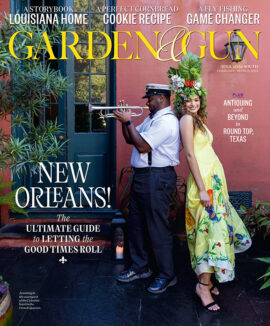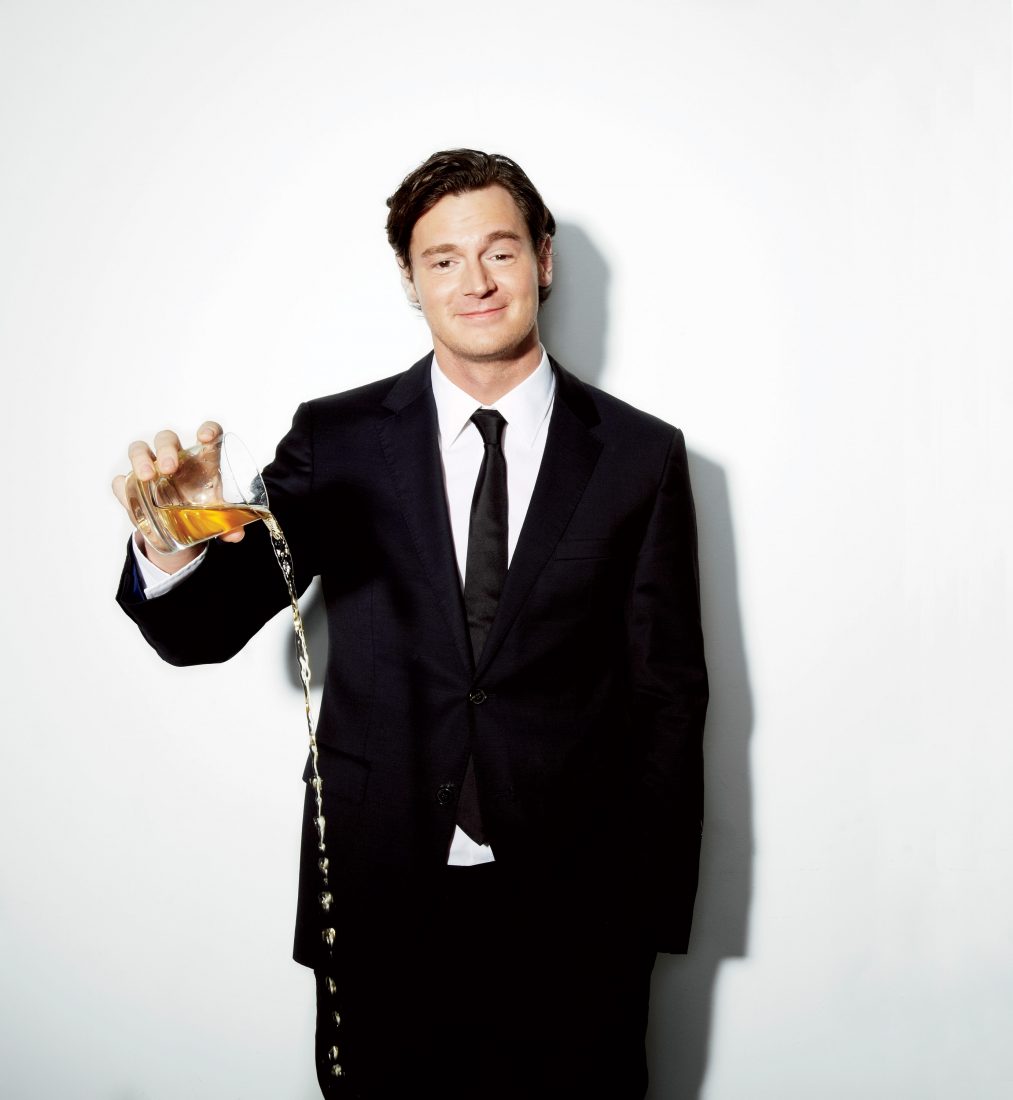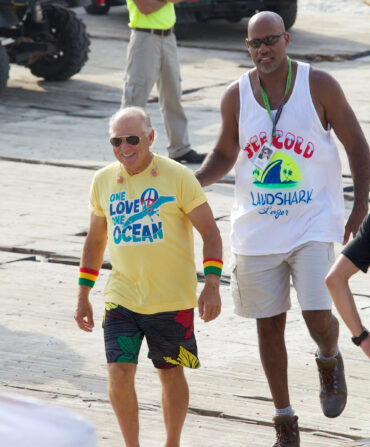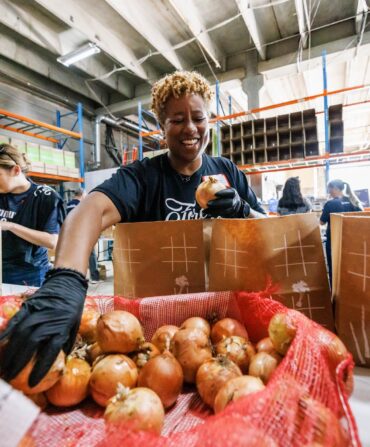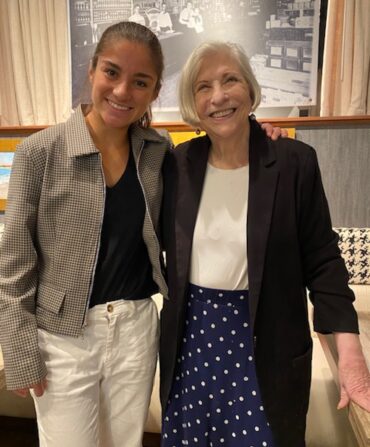Benjamin Walker is full of contradictions: He’s big and tall, yet disarmingly boyish. He’s a small-town, nature-loving Georgia kid who lives in New York City. He’s a classically trained theater actor who moonlights as a stand-up comic. But in Walker’s case, these incongruities blend to form the core of an acting career that’s demonstrably on the rise.
Walker was born and raised in Cartersville, Georgia (population 20,000), an hour northwest of Atlanta. After high school, he attended the Juilliard School to study acting. Upon graduating, he landed roles in the films Kinsey and Flags of Our Fathers, and in the critically acclaimed indie-punk Broadway musical Bloody Bloody Andrew Jackson. Playing the title role, Walker portrayed the nation’s seventh president as a moody, self-absorbed star, clad in tight jeans. He played the role of another U.S. president last summer in the film Abraham Lincoln: Vampire Hunter.

Photo: Copyright 2012 Joan Marcus
Leading Man
Walker onstage with Scarlett Johansson in Cat on a Tin Roof.
But 2013 may turn out to be Walker’s big year. He’s been costarring with Scarlett Johansson in a revival of the Tennessee Williams classic Cat on a Hot Tin Roof, and the thirty-year-old has lead roles in two upcoming HBO projects: Muhammad Ali’s Greatest Fight, in which Walker stars alongside Hollywood heavyweights Christopher Plummer and Frank Langella, and The Missionary, a drama set during the Cold War. Walker met his wife, Mamie Gummer, on the set of the Broadway revival of Les Liaisons Dangereuses. Gummer happens to be the daughter of one Meryl Streep.
Take us through your journey, from Cartersville to Juilliard to where you are now.
It was all pretty crazy. My family and community were always very supportive of me. I first went to a boarding school in Michigan, called Interlochen, for my senior year in high school. The three to four feet of snow we got in the winter was a bit shocking. Then it was on to Juilliard. I moved to New York and lived in a dorm for one year. They guaranteed one year of student boarding. Then the second year, you got put in a lottery. I drew a bad number. I had to move into the YMCA. And there, some guy decided he’d try to kill me.
What? Kill you?
Yeah, a crazy man. He just walked into the bathroom and tried to strangle me. It sounds a lot more dramatic than it was. What was traumatizing was the emotional aspect. It was the first time in my life that someone flat-out wanted to kill me. I could see it in his eyes. But he was really no threat. He was an elderly man. I knew I could easily put my foot right into his abdomen.
Your “Welcome to New York” moment sounds pretty harsh.
The whole deal was. Moving out of the South was tough. It was a culture shock. But I realize now that’s part of the gig when you decide to become an actor. Your life is going to be pretty much turned upside down anyway.
You worked on Bloody Bloody Andrew Jackson for four years before it made Broadway. Did you ever get impatient and just want to fast-forward to movie stardom?
Well, when you think something is good, you want other people to see it. The time it takes can get frustrating. But we were just so proud of it and confident in it, and every time we did it, we felt lucky to have the opportunity and grateful that people were still interested and that they wanted to keep taking it to the next level. We were kind of this band of misfits, telling a story we were passionate about. It was always exciting. But with musicals, it just takes forever. I knew that. You just have to stay in the fight. People these days watch American Idol and see people become stars overnight. But that’s not really how it all works. It’s a long haul.
You got splendid reviews for that show. And reviewers seemed to revel in mentioning the tight jeans.
They were horribly, horribly uncomfortable.
What drew you to stand-up comedy?
Stand-up is theater at its most basic. It’s one person in front of a group who is trying to tell a story or make them laugh. When I was at Juilliard for the first couple of years, they didn’t let us perform in public. So you did your stuff in front of a few professors and your peers. I really started to miss that small audience, the interaction. So I started going around town and doing open-mike nights.
You’re also a lover of history. Is there something about Southern history in particular that intrigues you?
Southern culture is a storytelling culture. That’s the way we know history, that’s how we pass it down, whether it’s family history or Southern history. That’s where my love of story-telling and theater began. When you’re done with dinner and all sitting around the table, catatonic, you share stories. That’s what theater and stand-up do the best. And that’s what I’m always trying to get back to, that sensation of family. As I’ve started to live out of suitcases and in hotel rooms, telling stories is what grounds me. It connects me to the South and saves me from going crazy.
And you’ve taken your love of fishing with you too, right?
I love to fish. There’s a place in Connecticut I escape to that has some great fishing. Some great bass fishing. But I mainly fish for peace of mind when I go up there.
We have to ask: How was Meryl’s wedding toast?
I always say that the only thing more intimidating than an international film star is your mother-in-law.

